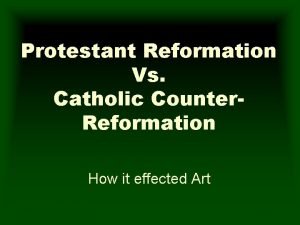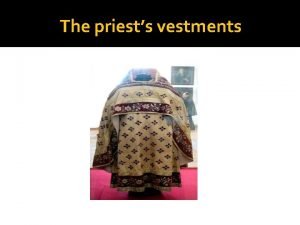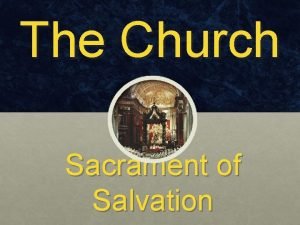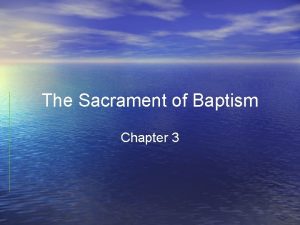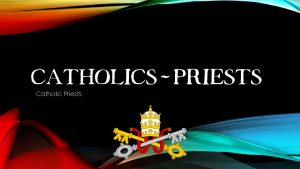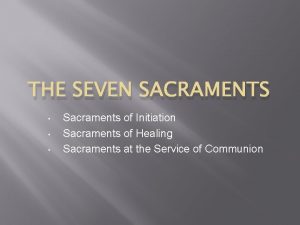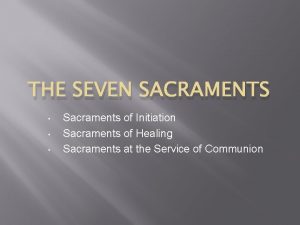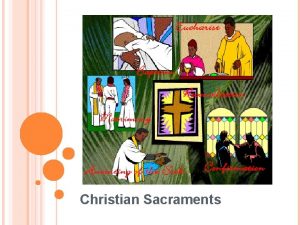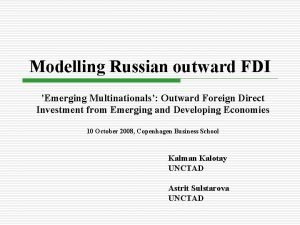CATHOLICS PRIESTS Sacraments SACRAMENTS Sacrament an outward physical








- Slides: 8

CATHOLICS ~ PRIESTS Sacraments

SACRAMENTS • Sacrament: an outward, physical sign of an inward, invisible grace • The Catholic and Orthodox Churches teach that there are seven sacraments: baptism, eucharist, confirmation, marriage, ordination, reconciliation, and anointing of the sick. Usually, these are all performed by an ordained priest.

SACRAMENTS • Baptism • Many Christians believe that sin was introduced into the world by Adam and Eve in the Garden of Eden and that since then everyone has been born in a state of Original Sin. For Christians this is removed by the sacrament of baptism. • In Christianity today it is Original Sin which is washed away by the sacrament of baptism when a baby or adult is first welcomed into the church. • Because baptism is seen as necessary for life and salvation by washing away Original Sin, the Catholic Church says that anyone, even if they themselves are not baptised, can baptise someone if life is at risk.

SACRAMENTS • Eucharist • For many Christians, the celebration of the Eucharist and receiving Holy Communion is at the centre of their worship: it is a sacrament, which means that it is a special way of receiving grace. Believers would say that the eucharist unites them with Christ. • Th e Eucharist recalls Jesus’ instructions at the Last Supper: • “For I received from the Lord what I also handed on to you, that the Lord Jesus on the night when he was betrayed took a loaf of bread, and when he had given thanks, he broke it and said, ‘This is my body that is for you. Do this in remembrance of me. ’ In the same way he took the cup also, after supper, saying, ‘This cup is the new covenant in my blood. Do this, as often as you drink it, in remembrance of me. ’” (1 Corinthians 11: 23 -25) • In all Churches the bread and wine are blessed using the words of Jesus, and then given to the congregation by the priest or a specially appointed person.

SACRAMENTS • Confirmation is the third and final sacrament of initiation. It is when a person who has been baptised is ‘confirmed’ in their faith. Although sometimes this happens when a child is only seven years old, it usually takes place at around 13. A bishop or priest lays their hands on the head of the person being confirmed giving a prayer and blessing and then anoints their forehead with Oil of Chrism. • Marriage • One of the most important aspects of a Christian marriage is that, for Catholics and Orthodox Christians, it is regarded as a sacrament. The Catholic Church teaches that marriage is a sacrament which a baptised couple administer to each other through their marriage vows. For a Catholic, marriage refl ects the union of Christ with the Church as his mystical body and therefore is unbreakable.

SACRAMENTS • Ordination (Holy Orders) • This sacrament is available only to men who are being ordained into the Church as deacons, priests, or bishops. • Prayers and blessings are offered and a bishop lays his hands on the head of the man being ordained. For those ordained as priests, this gives them the power to perform the sacraments of baptism, confirmation, marriage, absolve sins, and consecrate the Eucharist. They take vows of Chastity and Obedience.

SACRAMENTS • Reconciliation • Christians who feel that they need to be forgiven by God for something which they have done can go to their priest or minister to seek help. This is particularly In the Catholic Church where people go for the Sacrament of Reconciliation. The person who is seeking forgiveness (the penitent) goes to the priest and asks to be forgiven. • Jesus gave the power to his disciples to forgive sins on behalf of God and so this has been passed to priests. • After receiving absolution the penitent may be asked to say a certain number of prayers or do some work in the community as penance.

SACRAMENTS • Anointing of the Sick • When a Christian is dying a Christian minister will try to visit them to help them prepare for their death. The person may wish to confess their sins to the minister and, for Catholics, they may wish to receive a sacrament which is known as the Anointing of the Sick: • The person’s forehead and hands are anointed in the sign of the cross with the Oil of Unction, which is consecrated every year by a bishop at the Chrism Mass on Holy Thursday. • Task: • Choose three of the sacraments and write a short essay, explaining the importance of each, both to the Church and to the people receiving them.


